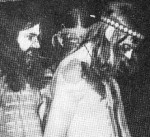Different time. Different attitude?

Typically, the current Castleton student probably imagines the 1970’s as a constant reefer-smoking, kumbaya-singing, beer-guzzling road trip. It’s all about romantic images mingled with visions of peace beads, guitar notes, and blond braids. But try to conceptualize a reality where students rallied, cared, and understood life in a way the current Castleton student may never understand.
Why you ask?
Muriel Landry, a Vermont native whose husband was drafted early in the Vietnam War and then returned home to work at Putney College, has some insight.
“Iraq is a class war,” she sighed. “In a draft war, everyone is a number. In this war, it’s mostly the kids who come from disadvantaged backgrounds that sign up. College students today might know a couple people overseas fighting. I graduated high school in ’65, there were at least 30 boys, drafted right then [immediately after graduation]… but there were a lot more as time went on”
Terry Jaye, part-time radio communications professor and part of Castleton’s graduating class of ’79, is still waiting for students to wake up and care about the current state of affairs. He makes no excuses.
And excuses, eloquently tongued, with slightly defensive intonation, are what you hear from students these days. Stuff like ‘No one will listen anyways,’ ‘I vote, that’s a form of silent protest,’ and ‘It’s hard to care, when no one will listen’ are all public relations terms for the same thing: I am more concerned with other things.
The late 1960’s and 1970’s were a black cloud. The death of John Kennedy and his brother Robert and the death of Martin Luther King fostered racial tension and suffrage. Nobody knew where the country was going and nothing looked prosperous.
So students rioted and revolted.
What Castleton alums of this period have in common is community. In good moments and the bad, the echo was still community. No mumbling excuses, no shuffling feet. Students in the ’70s were devoted to each other, to the faculty, and to America. They fought, they say, with their eyes to each other and fists in the sky.
“I’d say that whole era was a time when students were organizing and protesting, and at Castleton we had a pretty active “Rainbow Coalition” on civil rights stuff. The faculty was unionizing,” said Carl Hall from the class of ’78.
“A Black African accounting professor was denied tenure and I think fired, which we wrote a lot about in the Spartan,” he said.
Others remembered the tension-filled time period at Castleton and how students were different then.
“Students had passion. We would stay up all night working on radio dramas, to get better, for fun . We would be mad if a professor was late for class, not cheer. We had stuff to go over and we wanted the most we could get for the money” Jaye said of the difference between his students and life here as a student.
Speaking of radio, according to back issues of the Spartan, WIUV had a strong political voice in the 70’s, constantly hosting political candidates for governor and local offices and hosting a variety of news shows.




